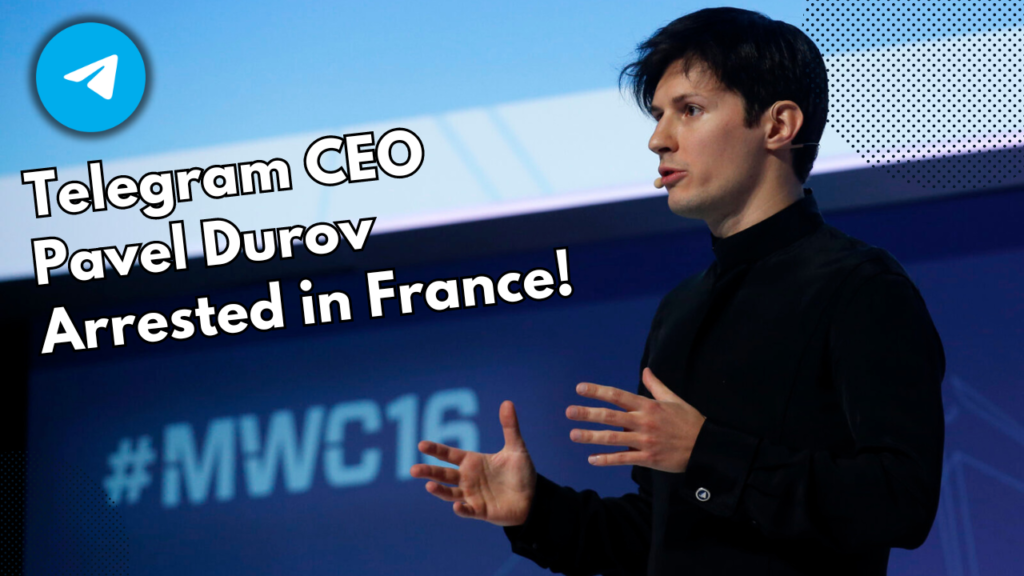
Pavel Durov, the CEO of Telegram, has been arrested by French authorities at Le Bourget Airport, located north of Paris. The arrest occurred shortly after Durov’s private jet landed, as reported by French media. Durov, a prominent billionaire and tech entrepreneur, faces legal troubles related to allegations against Telegram, his widely used messaging platform. The charges reportedly involve issues with moderation and the app’s alleged failure to address criminal activities effectively. This high-profile arrest has drawn significant attention and raised questions about the ongoing scrutiny of digital platforms and their leaders.
Details of the Arrest
Pavel Durov was apprehended by French police at Le Bourget Airport after his private jet arrived from Dubai. The arrest was executed under a warrant related to several serious allegations against him and his messaging app, Telegram. According to French authorities, Durov, 39, is facing charges linked to inadequate moderation on the platform.
The arrest follows an investigation into claims that Telegram has been used for illicit activities, including drug trafficking, child exploitation, and fraud. The investigation centers on accusations that Durov failed to implement sufficient measures to curb criminal use of the app, which is known for its encryption and large group capacities.
Durov’s arrest is part of a broader legal scrutiny into how Telegram manages and moderates content, particularly concerning its cooperation with law enforcement agencies. The charges highlight ongoing concerns about the app’s role in facilitating illegal activities and its approach to content moderation. The French authorities have yet to provide further details about the specific nature of the warrant or the evidence used to justify Durov’s detention.
Background on Pavel Durov
Pavel Durov, a Russian-born tech entrepreneur, is best known as the founder and CEO of Telegram, a leading messaging app known for its focus on privacy and security. Born in 1984 in Saint Petersburg, Russia, Durov initially gained recognition for creating VKontakte (VK), a popular social media platform in Russia, which he sold in 2014 after refusing to comply with government demands to shut down opposition communities.
After leaving Russia, Durov relocated to Dubai, where Telegram is now headquartered. Under his leadership, Telegram has grown significantly, becoming a major player in the global messaging space. The app is especially popular in Russia, Ukraine, and several former Soviet Union states, and is known for its robust encryption and large group capacities.
Durov holds dual citizenship in the United Arab Emirates and France. Despite his departure from Russia, Telegram’s relationship with the Russian government has remained contentious. In 2018, the Russian government attempted to ban Telegram due to Durov’s refusal to hand over user data to authorities. Although the ban was enforced for some time, it was eventually lifted in 2021.
Telegram’s features, including the ability to create groups with up to 200,000 members, have been both praised for their flexibility and criticized for enabling the spread of misinformation and extremist content. This duality has led to ongoing scrutiny of Telegram’s content moderation practices, making Durov a controversial figure in the tech world.
Investigation and Allegations
Pavel Durov’s arrest at Le Bourget Airport is part of a larger probe into Telegram’s content moderation practices. French authorities have issued an arrest warrant for Durov on charges related to the app’s alleged failure to control and moderate content effectively. The primary concerns involve Telegram’s handling of illegal activities such as drug trafficking, child exploitation, and fraud.
The investigation centers on accusations that Durov and Telegram have not sufficiently cooperated with law enforcement agencies in addressing these issues. Authorities claim that Telegram’s platform has been used to facilitate criminal activities, and that Durov’s management has not taken adequate steps to prevent misuse.
Telegram has consistently denied these allegations, asserting that it has robust measures in place to moderate content and collaborate with law enforcement when necessary. The company has faced criticism in the past for its content moderation policies, with critics arguing that its systems are weaker compared to other major social media platforms. The ongoing scrutiny reflects broader concerns about how digital platforms balance user privacy with the need to combat illegal activities.
International Reactions
The arrest of Pavel Durov has elicited a range of reactions from international figures and governments. The Russian Embassy in France quickly intervened, seeking to clarify the reasons behind Durov’s detention. They also expressed concerns about ensuring Durov’s rights and facilitating consular access. The embassy’s statement criticized the lack of cooperation from French authorities with Russian officials.
Russian officials and public figures have strongly condemned Durov’s arrest, accusing the West of double standards regarding free speech and democratic principles. They argue that the arrest represents a politically motivated attack on a prominent figure in the tech industry.
Prominent figures have also weighed in on the matter. Edward Snowden, the American whistleblower who has been living in Russia since 2013, described Durov’s arrest as an assault on fundamental human rights related to freedom of speech and association. Snowden’s comments highlight concerns over the implications of the arrest for digital freedoms.
Elon Musk, the owner of X (formerly Twitter), has been vocal about the situation. He posted multiple times on social media, using hashtags like #freepavel and commenting on the broader implications of the arrest. Musk’s posts have drawn attention to the issue and sparked discussions about the state of free expression in the digital age.
These international reactions reflect a broader debate about the balance between government control and individual rights in the context of global digital platforms.
Telegram Content Moderation
Telegram’s content moderation has been a point of contention since its inception. Known for allowing large group sizes of up to 200,000 members, the platform has faced criticism for its perceived laxity in moderating extremist and illegal content. This has led to concerns about the spread of misinformation, hate speech, and illegal activities on the app.
The platform’s decentralized nature, combined with its emphasis on privacy and encryption, makes it challenging to monitor and control content effectively. Critics argue that Telegram’s approach facilitates the organization of illegal activities, including drug trafficking, terrorism, and child exploitation, due to its limited content filtering and enforcement mechanisms.
In recent years, Telegram has been scrutinized for hosting far-right channels and groups involved in violent incidents. For instance, the app faced criticism in the UK for being used to coordinate violent protests. Although Telegram has taken steps to remove problematic groups and improve its moderation policies, many cybersecurity experts believe that its measures are still weaker compared to other major social media platforms.
The ongoing debate highlights the balance Telegram must strike between maintaining user privacy and addressing the challenges of content moderation on its platform.
Historical Context
Telegram has navigated a complex history of regulatory challenges and geopolitical tensions since its inception. Founded by Pavel Durov in 2013, the app quickly gained popularity for its focus on user privacy and encryption. However, its stance on data privacy has led to significant friction with various governments.
In 2018, Russian authorities attempted to block Telegram after Durov refused to comply with demands to provide encryption keys for user data. The Russian government argued that this refusal impeded their efforts to combat terrorism and organized crime. Despite the ban, Telegram’s widespread use and the availability of circumvention tools allowed many Russians to continue accessing the platform. The ban was officially lifted in 2021, but the incident underscored the ongoing struggle between digital privacy and state control.
Durov’s departure from Russia in 2014 followed his refusal to shut down opposition communities on his VKontakte social media platform, further illustrating his clash with Russian authorities. Telegram’s history reflects broader themes of governmental control versus digital freedom, highlighting the challenges tech companies face in balancing user privacy with compliance demands from different countries.
Conclusion
Pavel Durov’s arrest at Le Bourget Airport marks a significant development in the ongoing tension between digital privacy and regulatory oversight. The arrest underscores the broader challenges faced by tech companies like Telegram in navigating complex international legal landscapes. With Durov detained under allegations related to insufficient moderation of criminal content, the situation brings to light the ongoing debate over the responsibilities of digital platforms in policing their own environments.
This incident also reflects the broader geopolitical struggles over internet governance and freedom of expression. As Telegram continues to be a focal point in discussions about digital rights and content moderation, the implications of Durov’s arrest extend beyond individual legal issues. They highlight the difficulties that come with managing a global platform that operates across diverse regulatory frameworks and political environments.
As the investigation unfolds, the tech community, international observers, and users of Telegram will closely watch the impact on the platform’s operations and its approach to content moderation. The outcome could set important precedents for how digital platforms are regulated and how they balance privacy concerns with legal compliance in an increasingly interconnected world.




